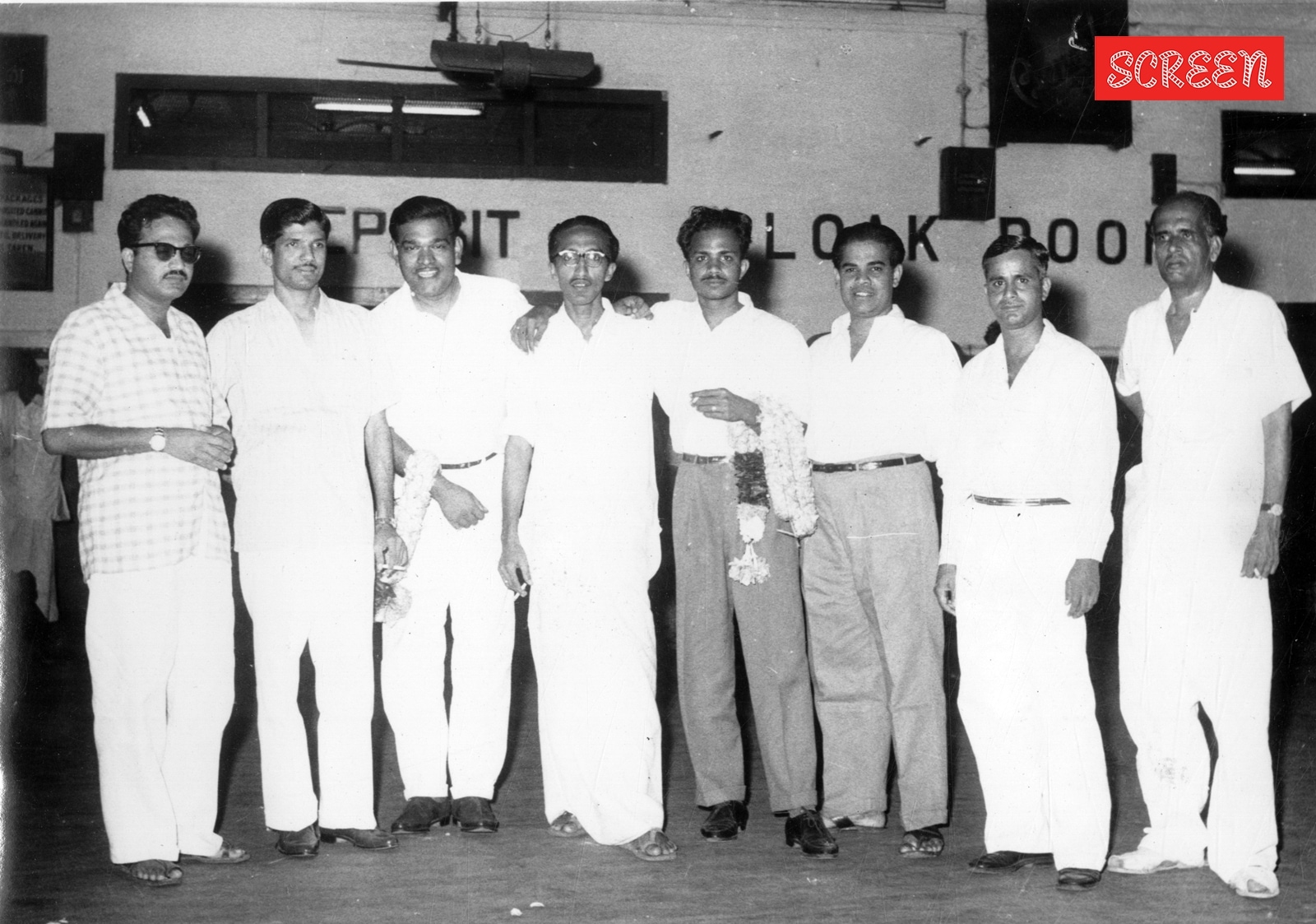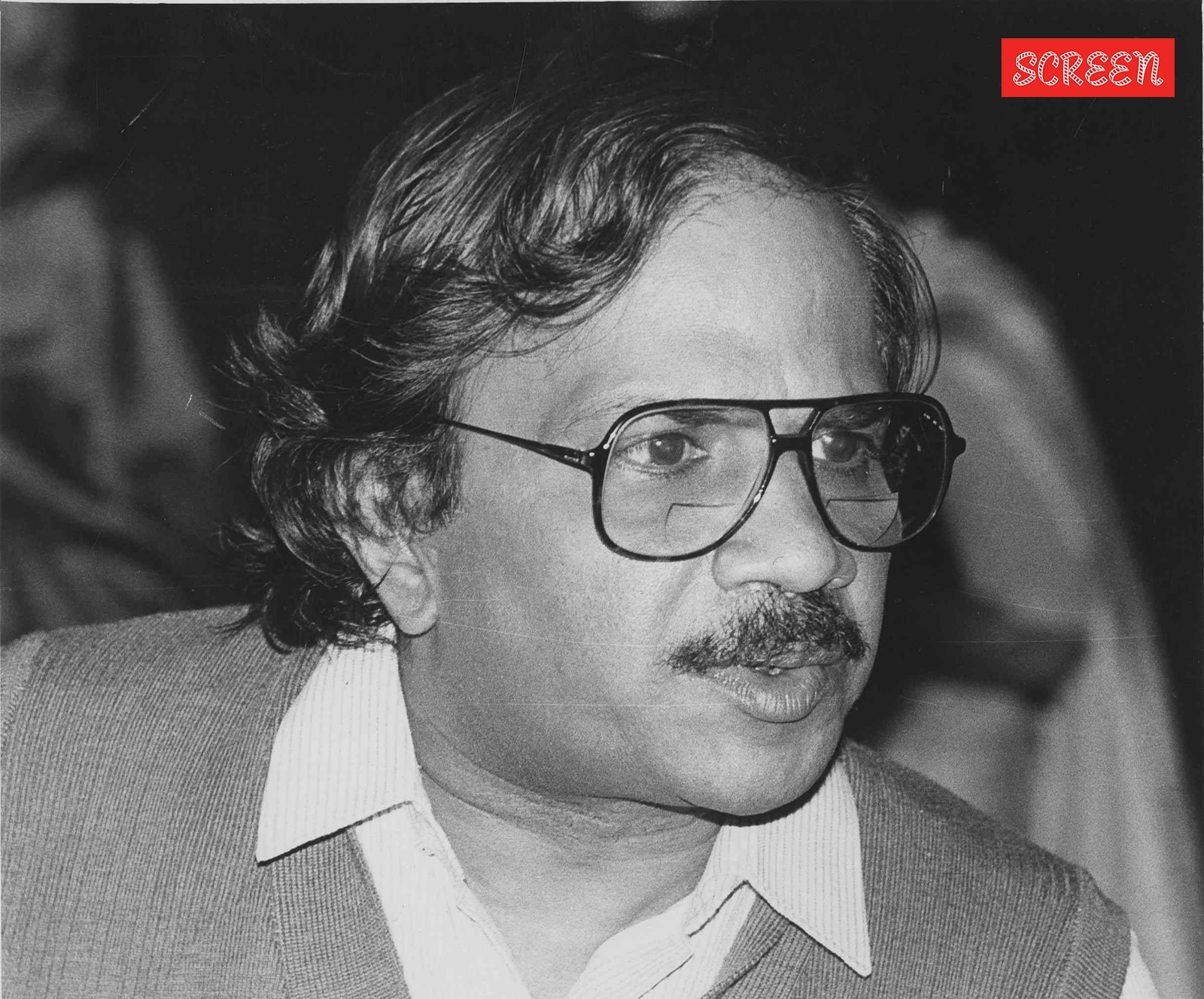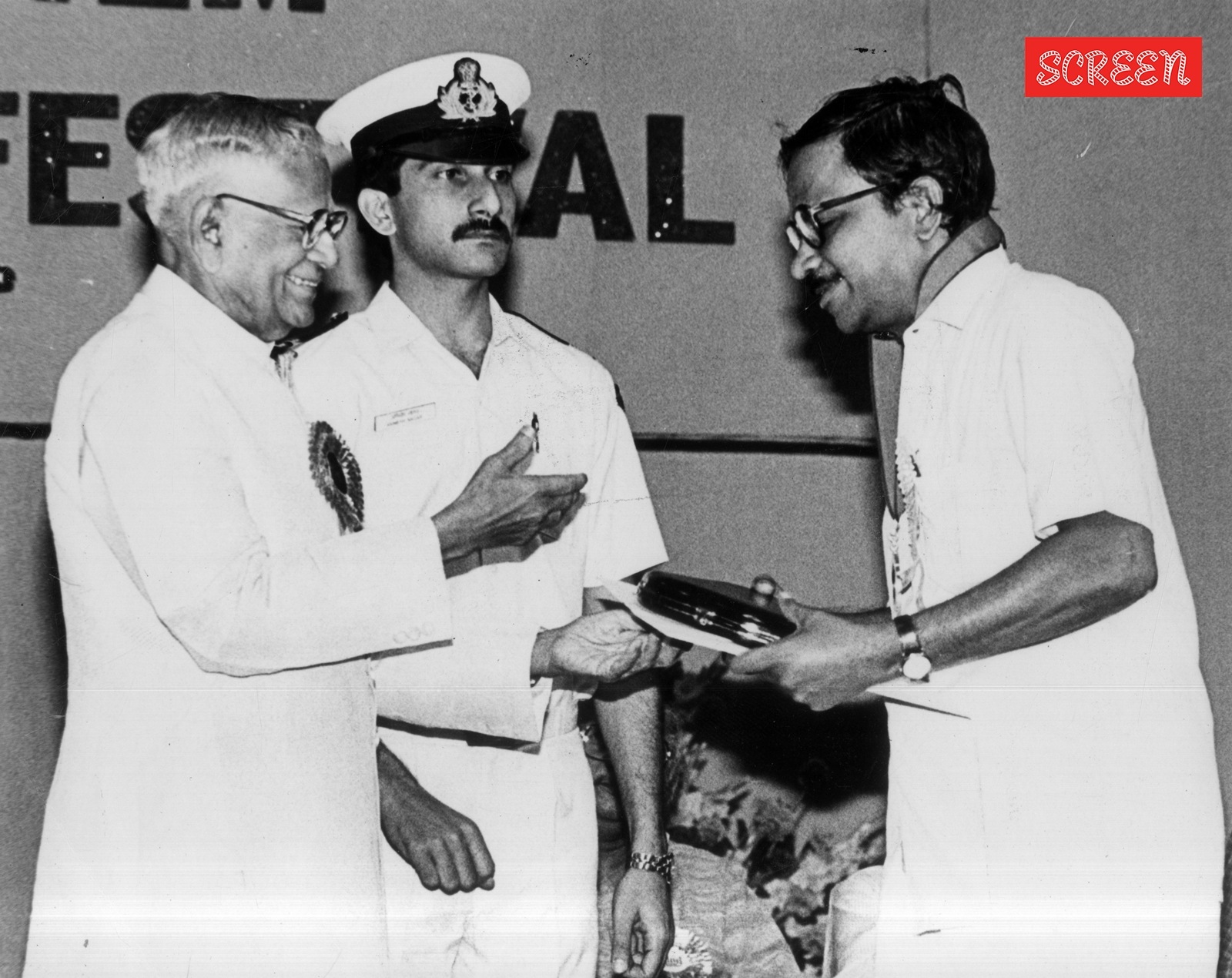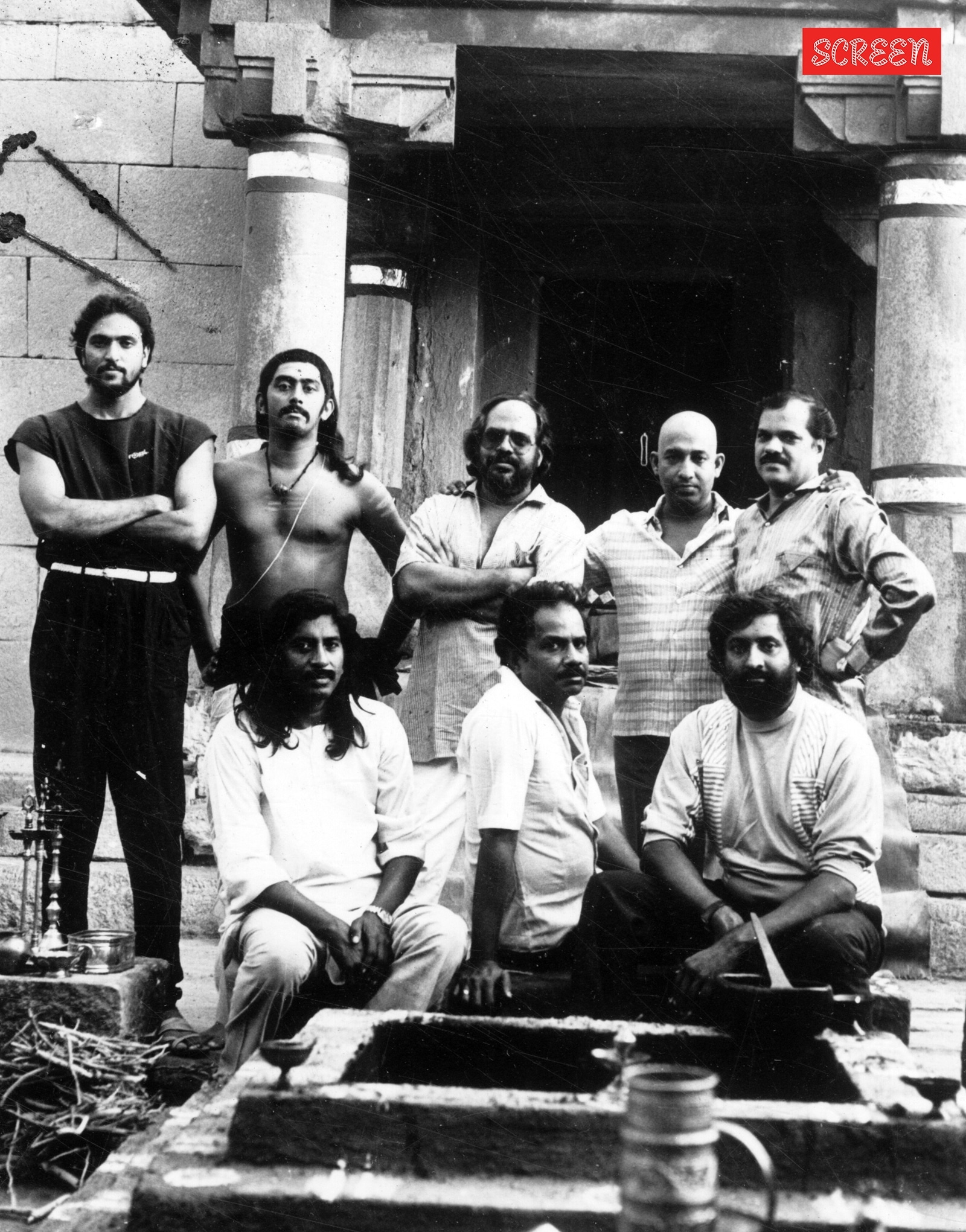I still remember the first time I read the book Parinayavum Mattu Thirakkathakalum, featuring three screenplays — Parinayam, Kadavu and Sadayam — written by MT Vasudevan Nair. I had watched all three films growing up, probably more than once, but reading their texts was a truly defining experience for me. As a teenager, it was then that I realised films are much more than just actors and their performances. Soon, I managed to find a copy of the film Sadayam (1992) and revisited it, keeping the book beside me, soaking in the magical way in which written words transformed into visuals, moving images, and eventually a complete film.
The literary flow of the work, paired with the outstanding characterisations — where each person has sharp and strong arcs — further enriched by vivid imagery and meticulous descriptions, taught the young me, who was already enamoured with movies, valuable lessons on cinema. At the same time, I also couldn’t help but marvel at how MT, renowned for his exceptional novels and short stories, wherein one has the space and luxury to delve into inner thoughts and character backgrounds, could craft such remarkable screenplays — where one needs to show more than tell. Well, that was MT Vasudevan Nair; whatever the medium was, if it involved language, he aced it, whether it was written or visual.
Don’t Miss | From Aattam and All We Imagine As Light to Aavesham and Bramayugam: 9 Best Malayalam films of 2024
As much of a doyen of Malayalam literature as he was, MT was also one of the path-breaking figures in the cinematic landscape, redefining the grammar of the medium at a time when it was still largely influenced by the traditions and style of professional drama. By facilitating the marriage between literature and cinema in Malayalam, MT, alongside other legendary authors like Vaikom Mohammed Basheer, Thakazhi Sivasankara Pillai, Uroob, P Kesavadev and Malayattoor Ramakrishnan, ushered in a new era in the industry, defined by stories that evoked humanism and ensured realistic portrayals of the lives, struggles and redemptions of ordinary people.
Born on July 15, 1933, in Kudallur village of Palakkad district, by the time he ventured into cinema, MT had already won the hearts of countless Malayalees through his impactful and poignant short stories and novels, including Naalukettu, Pathiravum Pakalvelichavum, Asuravithu, Manju and Olavum Theeravum, which were instrumental in shaping modern Malayalam literature.
 Cinematographer Vincent, Chandrathara Productions’ RS Prabhu, Ramu Kariat, K Parameswaran Nair, MT Vasudevan Nair, Adoor Bhasi, film distributor Chandran and K Padmanabhan Nair. (Express archive photo)
Cinematographer Vincent, Chandrathara Productions’ RS Prabhu, Ramu Kariat, K Parameswaran Nair, MT Vasudevan Nair, Adoor Bhasi, film distributor Chandran and K Padmanabhan Nair. (Express archive photo)
Living up to the hype surrounding his arrival, MT made a spectacular entry into cinema with Murappennu, directed by legendary cinematographer-director A Vincent, which became an immediate success, earning widespread acclaim. Centred around the practice of cousin marriage, Murappennu also exposed the arbitrariness of blood relations, emphasising that financial worth often dictates one’s place within familial structures. Interestingly, the movie, starring Prem Nazir, Sharada, Madhu, KP Ummer, PJ Antony and Jyothi Lakshmi, also exposed the hollowness of the so-called prestige and the “value of a word” that the savarnas often glorify and wear as a badge of honour, showing how these ideals are, in fact, up for sale.
MT’s literary mastery and command over the Malayalam language made an instant impression on both filmmakers and audiences alike. Thus, he continued to receive projects one after the other and he delivered exceptional works, with notable titles such as Pakalkkinavu (1966), Iruttinte Athmavu (1967), Nagarame Nandi (1967), Asuravithu (1968), Nizhalaattam (1970), Olavum Theeravum (1970), Mappusakshi (1971), Kuttyedathi (1971), and Vithukal (1971), many of which were based on his own literary works.
 MT Vasudevan Nair was born on July 15, 1933, in Kudallur village of Palakkad district. (Express archive photo)
MT Vasudevan Nair was born on July 15, 1933, in Kudallur village of Palakkad district. (Express archive photo)
Both MT’s literary works and films delved deeply into the fabric of society and human nature, exposing the grey within too. He also consistently challenged conformist ideologies, distancing himself from the dirt of his time. While many filmmakers often resorted to portraying rape victims as outcasts or even killing such characters off — a trope that persisted until recent years — MT took a radically different approach, asserting that survivors should never carry the burden of shame for crimes committed against them. In Olavum Theeravum, the protagonist Baputty (Madhu) declares without hesitation that his lover Nabeesa (Ushanandini) has not lost even a drop of her dignity or worth due to the rape she faced. Confronting the perpetrator Kunjali (Jose Prakash), he proclaims, “She did not consent to what happened. Not even a small part of her heart agreed to it. Knowing fully well that you violated her, I will marry Nabeesa.” For a society that treats women as lesser mortals — let alone survivors of sexual violence — and worships gods who abandon their wives over accusations of promiscuity, this dialogue and Baputty’s stance are a powerful, groundbreaking statement.
Two years later, when he made his directorial debut with Nirmalyam (1973), MT broke further away from conventional cinematic and societal norms. He crafted a film that critically examined theism, exposing the futility of blind devotion and questioning the time people spend praying for a better life instead of actively pursuing it. What set MT apart was his ability to weave such strong political commentary into his work without sacrificing its aesthetic value. In one of Indian cinema’s most iconic and evocative scenes, Nirmalyam ends with the protagonist, an oracle (PJ Antony), performing a traditional dance before the goddess and in an act of defiance, he spits blood at the deity, condemning the god for ignoring his suffering and ruining his life despite his unwavering devotion.
 MT Vasudevan Nair receives the National Film Award for Best Screenplay from the then President R Venkataraman. (Express archive photo)
MT Vasudevan Nair receives the National Film Award for Best Screenplay from the then President R Venkataraman. (Express archive photo)
Remarkably, MT refused to confine himself to a single style or genre and explored a wide array of themes and narratives. Yet, all his works carried his unmistakable signature — authentic, deeply rooted characters, particularly women, whose inner lives were meticulously explored, as evident in films like Kanyakumari (1974), Neelathamara (1979) and Oppol (1981).
In the 1980s, MT forged impactful collaborations with filmmakers and actors, partnerships that significantly shaped his career and integrated him deeper into mainstream cinema. During this period, he joined forces with filmmakers IV Sasi and Hariharan, delivering remarkable films such as Uyarangalil (1984), Aalkkoottathil Thaniye (1984), Adiyozhukkukal (1984), Anubandham (1985), Panchagni (1986), Nakhakshathangal (1986) and Abhayam Thedi (1984).
Watch Mammootty talking about MT Vasudevan Nair here:
Many of these films featured emerging actors Mammootty and Mohanlal, for whom collaborating with MT proved transformative. One of the hallmarks of MT’s scripts was his ability to create opportunities for both actors and technicians to excel. His films were not just about his writing prowess but collaborative efforts where every cast and crew member was given the space to shine. Films like Amrutham Gamaya (1987) and Oru Vadakkan Veeragatha (1989) were pivotal not only in establishing Mammootty and Mohanlal as exceptional actors but also in enhancing the careers of all involved. Not just MT but others also received prestigious accolades, including both National and State Film Awards, for their contributions to movies written by him. While PJ Antony became the first Malayalam actor to win the National Film Award for Best Actor for Nirmalyam, Balan K Nair (Oppol), Mammootty (Oru Vadakkan Veeragatha) and Monisha (Nakhakshathangal) also earned National Awards for their performances in MT’s films.
MT’s cinematic brilliance became even more evident through his partnership with Bharathan. As a painter-turned-director, Bharathan ensured visually stunning storytelling and the director masterfully translated MT’s evocative narratives into striking visuals, creating unforgettable cinematic experiences in films like Vaishali (1988) and Thazhvaram (1990). During this time, MT also ventured into new territories, creating folklore-inspired films such as Perumthachan (1990) and Vaishali while also exploring genres he had not previously tackled, as exemplified by the mystery thriller Utharam (1989), considered one of the finest Malayalam films in that genre. In the 1990s, MT shifted his focus to darker and more introspective themes, producing some of Malayalam cinema’s most emotionally intense films, including Kadavu (1991), Sadayam and Sukrutham (1994).
 MT Vasudevan Nair with Babu Antony, Asokan, Bharathan, Nedumudi Venu, MM Ramachandran, Krishnamurthy and Madhu Ambat on the sets of Vaishali. (Express archive photo)
MT Vasudevan Nair with Babu Antony, Asokan, Bharathan, Nedumudi Venu, MM Ramachandran, Krishnamurthy and Madhu Ambat on the sets of Vaishali. (Express archive photo)
However, MT’s repertoire wasn’t limited to political themes or hard-hitting dramas as he also crafted deeply touching films that explored the intricacies of human relationships and the yearning for companionship in movies like Ennu Swantham Janakikutty (1998), Oru Cheru Punchiri (2000) — one of the most genuine love stories in Malayalam cinema — and Theerthadanam (2001).
By the 2000s, MT had largely stepped back from cinema, having achieved unparalleled success. His only major original work during this time was Kerala Varma Pazhassi Raja (2009), an epic period drama directed by Hariharan and starring Mammootty. In 2013, MT and Hariharan reunited and revived their shelved 1982 project Evideyo Oru Shathru. The narrative was reworked and filmed anew as Ezhamathe Varavu, featuring Indrajith Sukumaran, Vineeth and Bhavana in key roles.
Express Eye | A river runs through it: The world of MT Vasudevan Nair
Notably, 2024 also marked the release of Manorathangal, an anthology streaming series comprising nine segments based on MT’s short stories. The series served as a heartfelt tribute to the legendary Jnanpith awardee, celebrating his unparalleled contributions to Malayalam literature and cinema.
Yes, the passing of MT Vasudevan Nair has created an irreplaceable void in the realms of Malayalam literature and cinema. Yet, it is not a loss, for he departed only after gifting his people, us, every story he had within him, leaving no tale untold or unshared. Thank you, MT, for teaching us that a story sans a soul is no story at all.
Why should you buy our Subscription?
You want to be the smartest in the room.
You want access to our award-winning journalism.
You don’t want to be misled and misinformed.
Choose your subscription package

